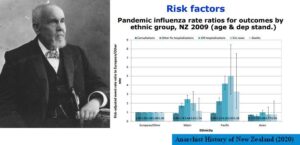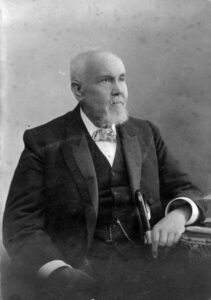1884: Health For The Maori
September 8, 2021
By AHNZ

James Pope was New Zealand’s first Inspector of Native Schools and in that capacity he wrote what was once a very famous handbook: Health for the Maori: A Manual for Use in Native Schools. It was published by the Government in 18841 and for some years after.
Then, as now, it is common knowledge that Maoris are a high-risk group for sickness and deadly disease. Many, like the young Apirana Ngata, had even accepted that the Maori race was doomed. Logan Campbell created a memorial tombstone to the dead race, his friends, the Maoris, alongside his own atop One Tree Hill in Auckland. Yet Pope knew that the Maoris didn’t need to die if only they would learn what he called the Laws of Hygiene and care for themselves the same way White people do. So, he wrote this book targeted at literate young Maoris who, he hoped, it was not too late to rescue from extinction.
‘James Pope became a fluent speaker of Māori and one of the best informed Pakehas of his time on Māori lore and traditions. He won the respect of tribal leaders throughout the country and conferred continually with them to establish schools, keep them in good running order, and ensure that the children of school age attended school regularly. He was known in the villages as “Te Popi”.’- Ref. Wikipedia
“Let us hope that in a few years’ time we shall be able to say, “The English people found out what the laws of health really were, and learned to live in accordance with them, and thus became a healthier, happier, more useful, and better people: so did the Maoris.””- Health for the Maori: A Manual for Use in Native Schools, James Pope (1884)
“A report in the New Zealand Medical Journal, published on Friday, shows Pacific people are three times more likely to need hospitalisation when infected with the virus than non-Pacific and non-Māori people. Māori were 2.5 times more likely to need hospitalisation.” – Covid-19: Māori and Pacific people more likely to be hospitalised – and younger, Stuff (2021)
 If he were alive today, Pope would be very sorry to see that his former wards still are behind when it comes to ‘the laws of health’ and the corresponding health outcomes. (‘Who needs to wash their hands and refrain from spitting when we all know Colonisation is to blame?’) As we know, Maoris, and Pacific Islanders, did not learn Pope’s lessons enough to avoid being an endangered demographic even in our own times.
If he were alive today, Pope would be very sorry to see that his former wards still are behind when it comes to ‘the laws of health’ and the corresponding health outcomes. (‘Who needs to wash their hands and refrain from spitting when we all know Colonisation is to blame?’) As we know, Maoris, and Pacific Islanders, did not learn Pope’s lessons enough to avoid being an endangered demographic even in our own times.
What Pope set out to do was to spark a health and hygiene revolution in the Maoris. To a point, he succeeded. The book was embraced as standard text by the Young Maori Party (eg James Carroll, Apirana Ngata, Peter Buck, Maui Pomare,) the Maori Parliament, and Wiremu Ratana’s Ratana Church2.
Why didn’t it fully succeed? Simple. The Westerner’s cultural embrace of hygiene has its roots in an energetic, even paranoid, craze during our Edwardian and late Victorian time period that Maoris have yet to experience. A cultural revolution cannot simply be delivered to a people by the distribution of textbooks, no matter how well-written. They are no substitute for what Anglo Saxon New Zelanders’ ancestors passed through to get us where we are today. No more than me writing articles about Anarchy on this page will ever be enough for Statist New Zealanders to give up their Statism!
During the Edwardian and late-Victorian eras that founded New Zealand as a British colony certain values were strongly held. A particular upgrade to our cultural firmware was installed vigorously. One historian even describes the adoption of hygiene culture as a “paranoid craze.”
These attitudes and practices are written into the cultural code of The West. British in particular practice ‘social distancing’ as a matter of normal interaction. As a result, we are infected less and especially transmit diseases less than other cultures yet to follow the same example. When I was a kid we were taught about Joseph Lister as a great hero of our society and the importance of his contribution to our culture.- 2020: Cultural Hygiene, AHNZ

If you’re interested in what Pope had to say in Health for the Maori: A Manual for Use in Native Schools you can read the text yourself. A summary for AHNZ is on the way just as soon as I can decrypt my own notes from 18 months ago.
Meanwhile, consider how much disease the Maori world knew prior to Western help in the following list. The Maori Witch Doctor (Tohunga) was not part of the tribe simply for decoration. Illness was not a colonial invention at all…
SOME OF THE DISEASES AMONGST THE ANCIENT MAORI
Skin diseases were common, there are at least 10 Maori words for it.
5 Words for diseases of the eye.
Toothache.
Tuberculosis.
Glandular fever.
Bone disease.
Leprosy.
—
1 c.October 1884, going by the Otago Daily Times. Ref. Papers Past
2 Ref. Abstract chosen by Professor Barbara Brookes, Department of History and Art History, Otago; otago.ourheritage.ac.nz
Image ref. Pope, Alexander Turnbull Library
Ref. Medicine Amongst the Maoris, in Ancient and Modern Times, Peter Buck thesis (1910); New Zealand Electronics Texts Collection, Victoria University
 Like Comment Share
Like Comment Share





